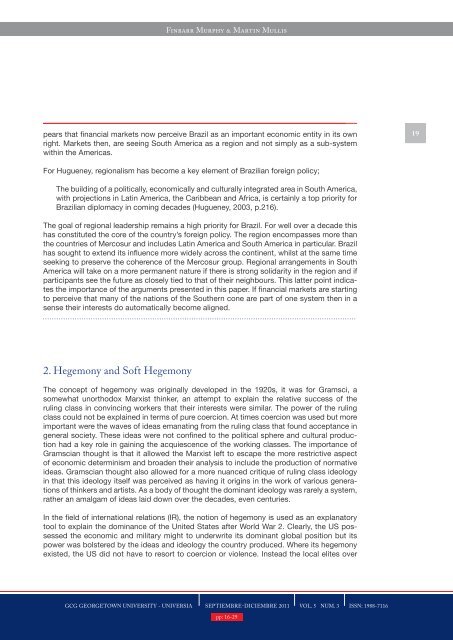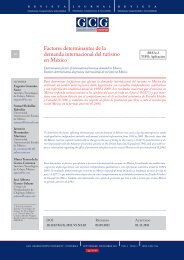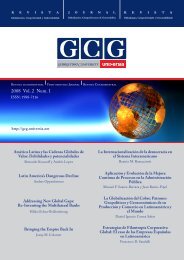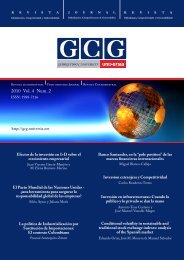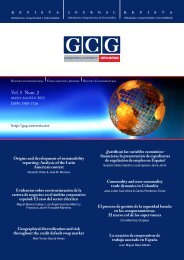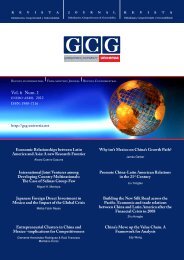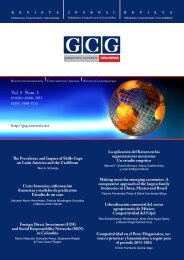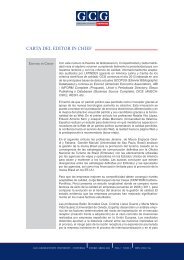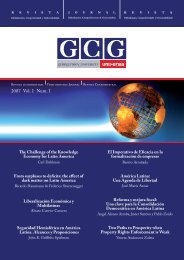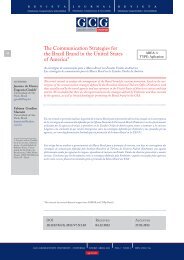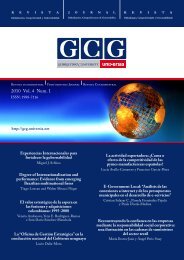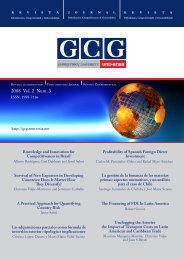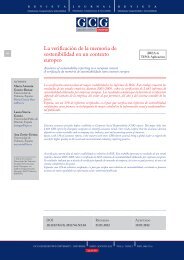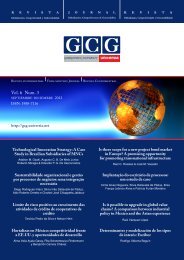Vol. 5 Num. 3 - GCG: Revista de Globalización, Competitividad y ...
Vol. 5 Num. 3 - GCG: Revista de Globalización, Competitividad y ...
Vol. 5 Num. 3 - GCG: Revista de Globalización, Competitividad y ...
- No tags were found...
You also want an ePaper? Increase the reach of your titles
YUMPU automatically turns print PDFs into web optimized ePapers that Google loves.
Finbarr Murphy & Martin Mullispears that financial markets now perceive Brazil as an important economic entity in its ownright. Markets then, are seeing South America as a region and not simply as a sub-systemwithin the Americas.19For Hugueney, regionalism has become a key element of Brazilian foreign policy;The building of a politically, economically and culturally integrated area in South America,with projections in Latin America, the Caribbean and Africa, is certainly a top priority forBrazilian diplomacy in coming <strong>de</strong>ca<strong>de</strong>s (Hugueney, 2003, p.216).The goal of regional lea<strong>de</strong>rship remains a high priority for Brazil. For well over a <strong>de</strong>ca<strong>de</strong> thishas constituted the core of the country’s foreign policy. The region encompasses more thanthe countries of Mercosur and inclu<strong>de</strong>s Latin America and South America in particular. Brazilhas sought to extend its influence more wi<strong>de</strong>ly across the continent, whilst at the same timeseeking to preserve the coherence of the Mercosur group. Regional arrangements in SouthAmerica will take on a more permanent nature if there is strong solidarity in the region and ifparticipants see the future as closely tied to that of their neighbours. This latter point indicatesthe importance of the arguments presented in this paper. If financial markets are startingto perceive that many of the nations of the Southern cone are part of one system then in asense their interests do automatically become aligned.2. Hegemony and Soft HegemonyThe concept of hegemony was originally <strong>de</strong>veloped in the 1920s, it was for Gramsci, asomewhat unorthodox Marxist thinker, an attempt to explain the relative success of theruling class in convincing workers that their interests were similar. The power of the rulingclass could not be explained in terms of pure coercion. At times coercion was used but moreimportant were the waves of i<strong>de</strong>as emanating from the ruling class that found acceptance ingeneral society. These i<strong>de</strong>as were not confined to the political sphere and cultural productionhad a key role in gaining the acquiescence of the working classes. The importance ofGramscian thought is that it allowed the Marxist left to escape the more restrictive aspectof economic <strong>de</strong>terminism and broa<strong>de</strong>n their analysis to inclu<strong>de</strong> the production of normativei<strong>de</strong>as. Gramscian thought also allowed for a more nuanced critique of ruling class i<strong>de</strong>ologyin that this i<strong>de</strong>ology itself was perceived as having it origins in the work of various generationsof thinkers and artists. As a body of thought the dominant i<strong>de</strong>ology was rarely a system,rather an amalgam of i<strong>de</strong>as laid down over the <strong>de</strong>ca<strong>de</strong>s, even centuries.In the field of international relations (IR), the notion of hegemony is used as an explanatorytool to explain the dominance of the United States after World War 2. Clearly, the US possessedthe economic and military might to un<strong>de</strong>rwrite its dominant global position but itspower was bolstered by the i<strong>de</strong>as and i<strong>de</strong>ology the country produced. Where its hegemonyexisted, the US did not have to resort to coercion or violence. Instead the local elites over<strong>GCG</strong> GEORGETOWN UNIVERSITY - UNIVERSIA SEPTIEMBRE-DICIEMBRE 2011 VOL. 5 NUM. 3 ISSN: 1988-7116pp: 16-29


